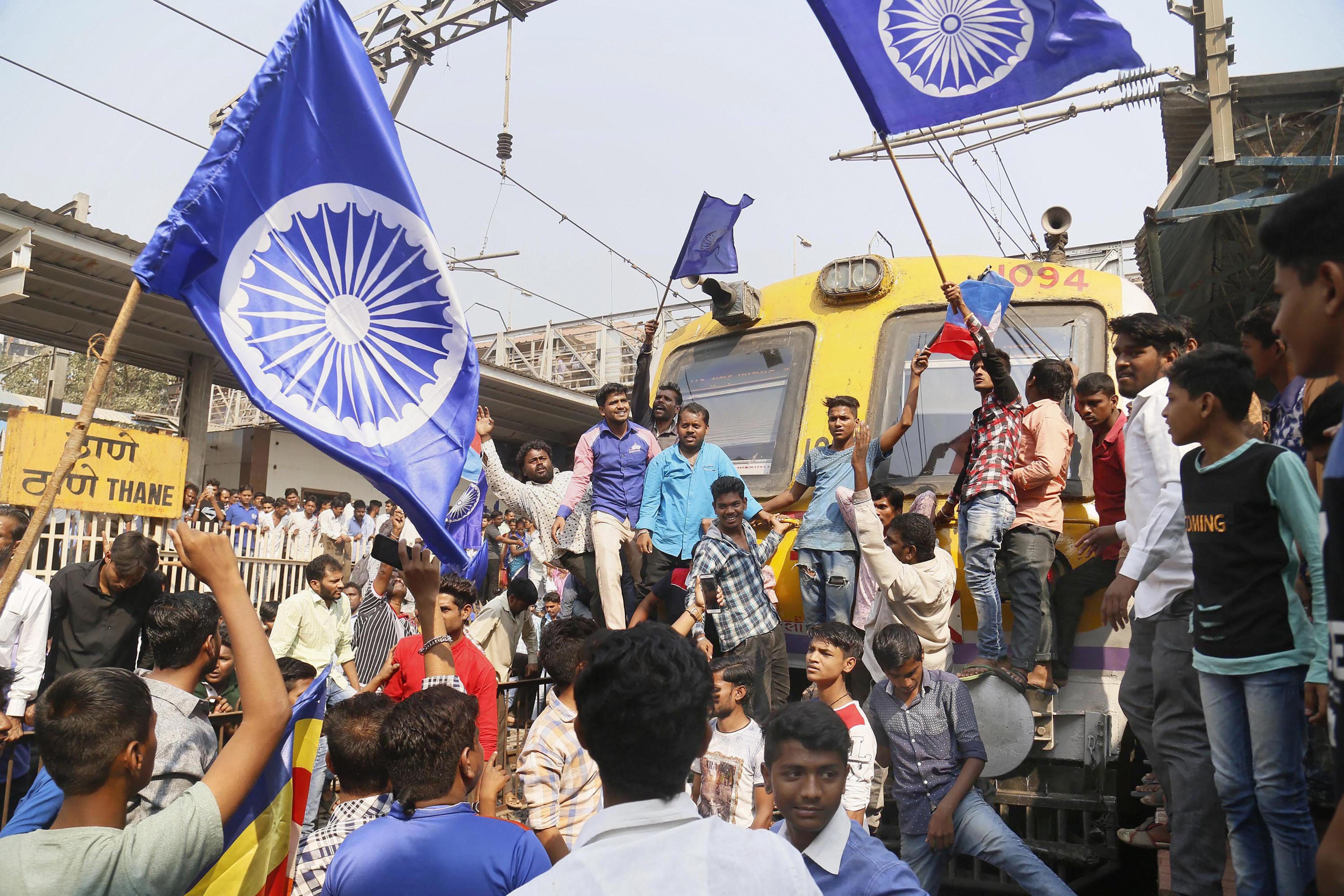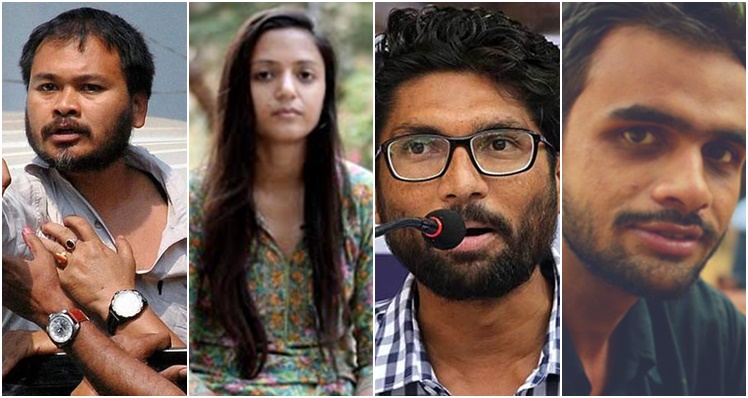The rally, to be held on January 9, is against the Modi government’s failure to generate jobs and the right-wing crackdown on Dalits and Muslims.
New Delhi: Dalit leader and recently-elected independent legislator in Gujarat, Jignesh Mevani, human rights activists Akhil Gogoi and Bezwada Wilson, student leaders Umar Khalid and Shehla Rashid and many others will train their guns at the Union government in a rally in Parliament Street, New Delhi, on January 9.
The rally is supposed to be the beginning of a series of such rallies led by young leaders across India against the Narendra Modi-government’s failure to generate enough jobs and the increasing instances of right-wing violence on Dalits and Muslims.
Motivated by different spontaneous agitations across India – like Dalit protests following the attack on Dalits at Bhima Koregaon or in Saharanpur, Uttar Pradesh, after the arrest of Bhim Army leader Chandrasekhar Azad ‘Ravan’ or the Hardik Patel-led Patidar agitation – the Yuva Hunkar rally, as the January 9 agitation has come to be called, seeks to consolidate different independent people’s movements across the country under one oppositional umbrella.
“We, especially the young, are staring at a dark future. The attacks on Muslims and Dalits have been increasing. The Bharatiya Janata Party-led Union government has done nothing to stop its own leaders from perpetuating hate across the country. At the same time, the government has miserably failed to economically uplift any community. The government is nowhere close to generating two crore jobs every year as it had promised. Constant price rise has broken people. The rally in Delhi will address these concerns,” said Nakul Singh Sawhney, documentary filmmaker, and one of the organisers of the rally.
While most such spontaneous rallies have evolved from caste-based mobilisations, the January 9 event, the organisers say, will try and highlight the economic concerns of a large mass of people apart from addressing issues of social justice.
“Across the Hindi-belt, an environment of hate is being encouraged by the Sangh parivar. Chandrasekhar Azad and Akhil Gogoi are facing the draconian National Security Act, Jignesh Mevani is being portrayed as a terrorist by the right wing. The events of the last three years clearly suggest that anyone who is speaking against communalism, casteism, or poverty ends up being targeted by the Modi government,” said Sawhney, adding that the rally will mark the beginning of an independent opposition and will be led by different young leaders from India.
“We will not only talk about Dalits and Muslims. We will also talk about issues of transport workers, anganwadi workers, tea plantation workers and school teachers. We will try to consolidate the opposition forces on the ground so that our movement articulates the most pertinent concerns of the people,” said Sawhney.
Nadeem Khan, one of the organisers and a leader from the United Against Hate campaign, said, “If anyone wants to support us, they are welcome as long as they do not try to appropriate the movement as their own. We want the movement to evolve in a truly democratic spirit.”
He added, “Look, Najeeb Ahmed disappeared 15 months ago and the government seems to have forgotten him despite so many people raising the issue. Allahabad’s Richa Shukla had to stay in jail for 50 days after she showed a black flag to Yogi Adityanath (Uttar Pradesh’s chief minister). The brutal way the Adityanath government handled women’s protests in Banaras Hindu University was shameful. Today, if a Muslim with a cap leaves his home in Deoband or Saharanpur for Delhi, he is scared of reaching Delhi safe. Such is the environment. Because of such incidents, we want to go to common people and articulate their concerns.”

Dalit groups protesting at Thane railway station, Mumbai during the Maharashtra bandh following the Bhima Koregaon violence. Credit: PTI
Khan said that after tomorrow’s rally, several teams will be constituted which will start campaigning in the Hindi-belt, especially in Uttar Pradesh and poll-bound Rajasthan, Madhya Pradesh and Chhattisgarh.
Khalid Saifi, another organiser, said: “We felt the need of some sort of people-oriented politics which will raise social and economic issues. The mainstream political parties, I don’t think, understand or articulate the problems and concerns of the Indian youth. We will do that. Tomorrow will be the beginning of that process. The Modi government came to power with the support of the youth and they are the ones who feel the most betrayed after three years of his rule.”
The organisers claim that they have been holding corner meetings at various places across north India and they expect those people to turn up for the rally, in which around 25 organisations will participate.
“We will engage with all civil society organisations except those who are either directly or indirectly affiliated to the Rashtriya Swayamsevak Sangh,” said Saifi.
Pradeep Narwal, a JNU student and a member of Dalit Morcha, said, “Being a Dalit, I know how atrocities against Dalits have increased under this government. In Haryana, many of them still await justice from the government. Two days ago, I went to Mumbai to speak at a meeting but the police arrested both me and Richa Singh, the UP-based student leader. The government has left no room for any form of criticism. The youth feel agitated and tomorrow’s rally will begin an organised process to consolidate the anger on the ground. After tomorrow, I will start campaigning in Haryana on issues of Dalit dignity and employment.”
Asked how such a movement will balance economic concerns and caste-based identity politics together, Narwal said, “Right now, we understand that the rising agitations across the country reflect poorly on government’s policies and its approach on different social issues. Our idea is to connect to the youth. The immediate contradiction between the oppressed and oppressor is felt in a more caste-based way in Indian villages. But the way this government has functioned in the last few years, we feel that it will not be the same. Economic conditions of people across caste groups will dominate the agitations against the government. That is why the dominant Patidars and Dalits came together in Gujarat. In our effort to seek systematic transformational change, we want to consolidate that sentiment on the ground.”
However, when asked whether they wanted to contest elections, they said that they are not looking to fight elections at the moment but to bring different people’s movements under one umbrella. “We do not want any formal alliances with the opposition parties but are willing to welcome their support on issues they raise. Jignesh Mevani won as an independent with the support of various parties. We can possibly look for such opportunities in future. It is a long road ahead.”
>


Comments are closed.